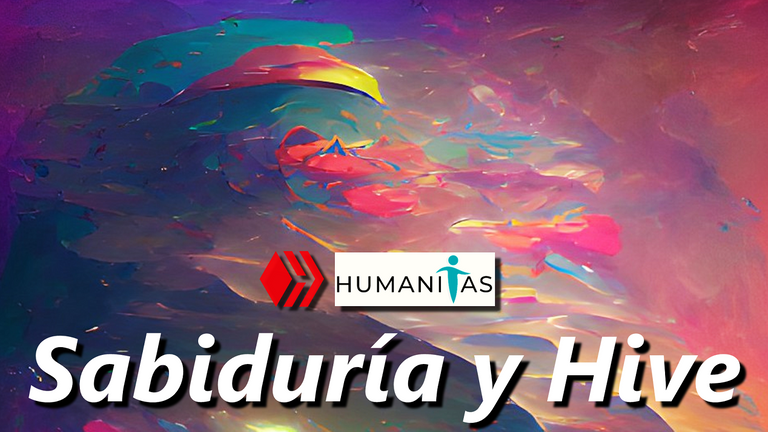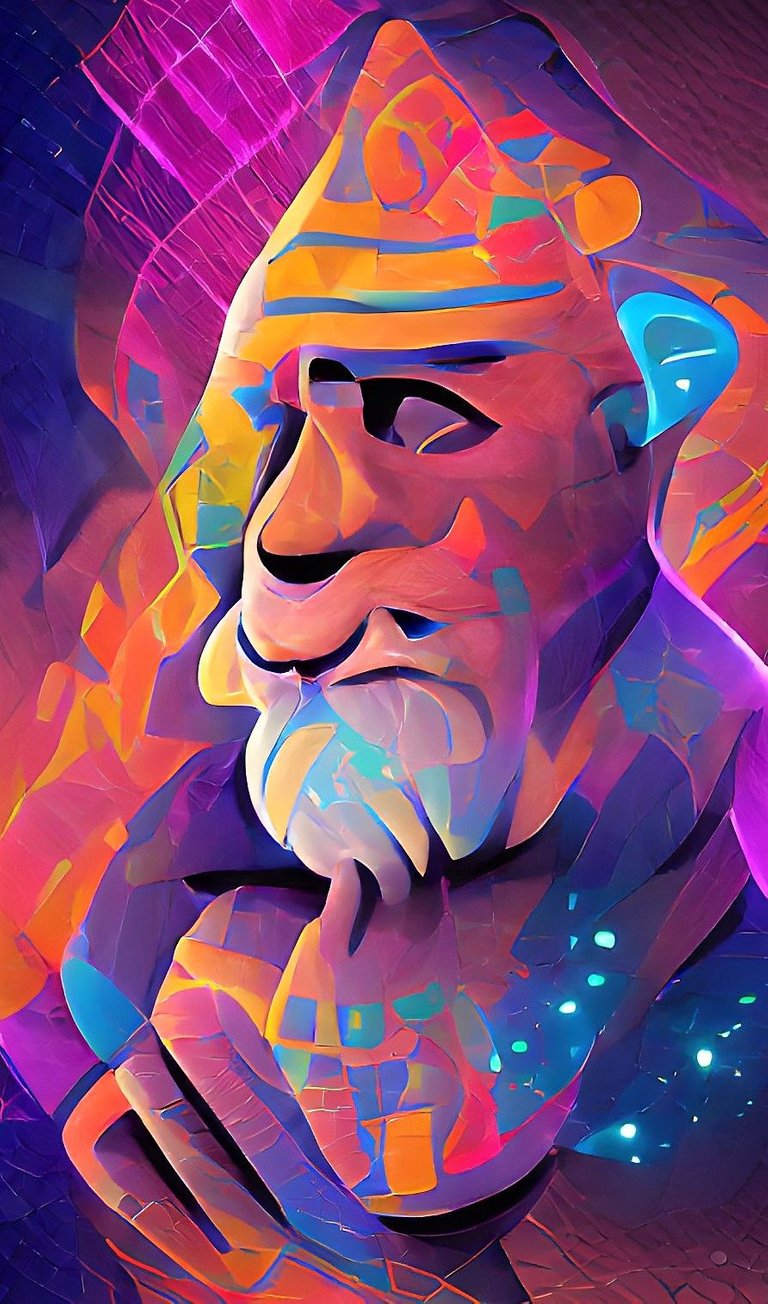Sabiduría ¿Qué la diferencia del conocimiento? En esta publicación trataré de reflexionar un poco acerca de este tema, propuesto en la comunidad #Humanitas la semana anterior, y conectarlo un poco con lo que hacemos cotidianamente en #Hive.
Este es el enlace de la iniciativa: Iniciativa: Cultura Humana semana 19: Palabras de Sabiduría. En la comunidad Humanitas.
Recuerda que puedes participar aún si la semana de la iniciativa terminó.

También está activa ya la iniciativa de esta semana, relacionada al Miedo: Iniciativa “Cultura Humana” Semana N°20: El Miedo.
Con respecto a la sabiduría, lo relaciono mucho con la idea que Platón tenía respecto al mundo de las ideas. Te recomiendo ver este video. Es decir, la sabiduría sería una especie de conocimiento adquirido mediante la experiencia que se relaciona al mundo de las ideas o "mundo perfecto", según lo describe Platón. Resumiendo brevemente esta idea, según Platón, existen dos mundos: el mundo sensible de las cosas, al cual pertenece nuestro cuerpo y podemos percibir con nuestros sentidos; y el mundo de las ideas, el cual es la esencia detrás de las cosas, invisible, inmaterial y perfecto o ideal.
Creo que también, de alguna manera, tal como dice Platón, todas las cosas y nosotros los seres humanos estamos siempre en una constante búsqueda o camino de acercarnos o parecernos en la mayor medida posible a este mundo de las ideas o mundo ideal. Y también, como dice el video, este mundo ideal está en nosotros y existe constante "interacción" entre ambos mundos. Creo que de alguna manera Platón nos dice que la sabiduría se trata de aprender a conectarnos o acercarnos en la mayor medida posible a ese mundo ideal de las ideas.
Y ¿Cómo se relaciona esto a #Hive? En realidad, no sólo podríamos relacionar esto a Hive sino a cualquier aspecto de la vida y lo humano. No existen reglas escritas o literales acerca de cómo vivir, así como tampoco acerca de qué hacer dentro de Hive o cómo. Sin embargo, todos de alguna manera aprendemos a "hacer las cosas bien", es decir, a ir por un camino más ideal que el anterior en el cual podamos hacer las cosas mejor, ya sea en el trabajo, en las relaciones con otras personas, o en Hive.
Y una vez que hemos encontrado un camino mejor por donde transitar, podría decirse que la experiencia nos hizo un poco más sabios. La idea de todo esto es que en la medida en que logramos hacer las cosas mejor, estamos haciendo que nuestra realidad se parezca más a ese "mundo ideal". Y la sabiduría sería lo que hemos aprendido para llegar a plasmarlo.
Hive no nació con un manual de instrucciones para sus usuarios, simplemente nació, y a partir de allí, todos nosotros los usuarios hemos ido aprendiendo a desenvolvernos en este ecosistema, aprendiendo de otros y también por nuestra cuenta. Nunca hubo alguien o un grupo de personas que dijera "esto es lo que hay que hacerse para tener buenos resultados", simplemente, todos hemos ido descubriendo qué es eso que da buenos resultados, qué no da buenos resultados, y otros usuarios en especial se encargan de transmitir lo aprendido a otros.
De alguna manera, siempre tendemos a ir perfeccionando o dando orden a las cosas para así adquirir y transmitir parte de la sabiduría. Sin embargo, es algo que se debe adquirir por experiencia, ya que sabiduría y conocimiento no es lo mismo. Conocimiento es ya nuestra percepción intelectual de reconocer algo. Pero por sí solo no nos da la sabiduría sin haber experimentado.
A veces considero que no es necesario tanto sufrimiento para aprender algo, esto muchas veces se relaciona con maneras antiguas de la educación escolar o universitaria y prácticas similares. Aunque el sufrimiento y el dolor es parte del aprendizaje, en exceso puede ser más perjudicial que provechoso. Por ello creo que la sabiduría no sirve de mucho si no es transmitida a otros para así facilitar o incentivar el desarrollo de todos como humanos en general. Las ideas o el mundo perfecto de las ideas existe independientemente de nosotros, pero nosotros sin el acceso a esas ideas estaríamos perdidos.
Espero que haya disfrutado de esta lectura. Invito a participar a @nbarrios67 @maryed @indumukhi @pablo1601 @josevas217 ya sea en la iniciativa actual referente al Miedo o a la anterior referente a las Palabras de Sabiduría.

Wisdom What differentiates it from knowledge In this post I will try to reflect a bit on this topic, proposed in the #Humanitas community the week before, and connect it a bit to what we do on a daily basis at #Hive.
Here is the link to the initiative: Initiative: Humanitas Culture week 19: Words of Wisdom. In the Humanitas community.
Remember that you can still participate even if the initiative week is over.

This week's initiative, related to Fear, is also already active: Initiative "Human Culture" Week N°20: Fear.
Regarding wisdom, I relate it very much to the idea that Plato had regarding the world of ideas. I recommend you to watch this video. That is, wisdom would be a kind of knowledge acquired through experience that relates to the world of ideas or "perfect world", as described by Plato. Briefly summarizing this idea, according to Plato, there are two worlds: the sensible world of things, to which our body belongs and which we can perceive with our senses; and the world of ideas, which is the essence behind things, invisible, immaterial and perfect or ideal.
I believe that also, in a way, as Plato says, all things and we human beings are always in a constant search or way to approach or resemble as much as possible this world of ideas or ideal world. And also, as the video says, this ideal world is in us and there is constant "interaction" between both worlds. I think in a way Plato is telling us that wisdom is about learning to connect or get as close as possible to that ideal world of ideas.
And how does this relate to #Hive? Actually, not only could we relate this to Hive but to any aspect of life and the human. There are no written or literal rules about how to live, as well as what to do within Hive or how. However, we all somehow learn to "do things right," that is, to go down a more ideal path than before in which we can do things better, whether at work, in relationships with other people, or in Hive.
And once we have found a better path to follow, it could be said that experience has made us a little wiser. The idea of all this is that to the extent that we manage to do things better, we are making our reality more similar to that "ideal world". And wisdom would be what we have learned to make it happen.
Hive was not born with an instruction manual for its users, it was simply born, and from there, all of us users have been learning how to manage in this ecosystem, learning from others and also on our own. There was never someone or a group of people who said "this is what you have to do to have good results", simply, we have all been discovering what gives good results, what does not give good results, and other users in particular are responsible for transmitting what they have learned to others.
Somehow, we always tend to perfect or give order to things in order to acquire and transmit part of the wisdom. However, it is something that must be acquired through experience, since wisdom and knowledge are not the same thing. Knowledge is already our intellectual perception of recognizing something. But by itself it does not give us wisdom without having experienced.
Sometimes I consider that it is not necessary to suffer so much to learn something, this is often related to old ways of school or university education and similar practices. Although suffering and pain is part of learning, too much of it can be more harmful than helpful. That is why I believe that wisdom is of little use if it is not transmitted to others in order to facilitate or encourage the development of all of us as humans in general. Ideas or the perfect world of ideas exists independently of us, but without access to those ideas we would be lost.
I hope you enjoyed this reading. Leave your comment or opinion.
Translated to English language with the help of DeepL.com
Otras redes sociales:
 |
 |
 |
 |
F1 & motorsports: @acontmotor
 |
 |
 |
 |
| ¡Gracias por visitar! — ¡Thanks for visiting!  |

Muchas gracias por tu invitación @acont !!
Esta semana estaré activandome nuevamente con las publicaciones después del #hivemeetupargentina que llevó mucho tiempo!
Abrazo
Saludos amigo @pablo1601, excelente, estaremos esperando tus publicaciones
¡Saludos #Humanitas!
Congratulations @acont! You have completed the following achievement on the Hive blockchain and have been rewarded with new badge(s):
Your next target is to reach 80000 upvotes.
You can view your badges on your board and compare yourself to others in the Ranking
If you no longer want to receive notifications, reply to this comment with the word
STOPCheck out the last post from @hivebuzz:
Amigo @acont que excelente tema del conocimiento y la sabiduría. Casi todo las cosas que aprendemos aquí en HIVE muchas es por nuestra cuenta pero la mayoría es orientado por otros de diferentes formas, videos, post escritos, por comentarios, clases por Telegram y en casi todo lo que hacemos aquí tiene sus normas. Es importante como tú dices hacer las cosas bien, pero lo ""bien" es subjetivo muchas veces. Este tema es muy interesante y tu contenido me ha hecho pensar y reflexionar. También me ha hecho plantearme muchas interrogantes. Gracias por compartir y un placer leerte 🤗.
Ese "Bien" es muy subjetivo, sin embargo, casi siempre vamos a ir mejorando.
Gracias por comentar ¡Saludos!
Saludos, amigo, me gustó esa comparativa con Hive, ciertamente es en el camino en nuestra plataforma, como nos vamos haciendo "sabio" respecto a la misma, y así en cualquier aspecto de nuestras vidas, como también lo indicas.
Querido amigo @acont siempre he pensado que el mejor modo de aprender es enseñar, y me has hecho pensar en esto con tu reflexión. Platón tiene una escala del conocimiento que me parece muy actual, a veces poienso que no hay nada que no haya sido pensado ya por los antiguos jejeje Saludos